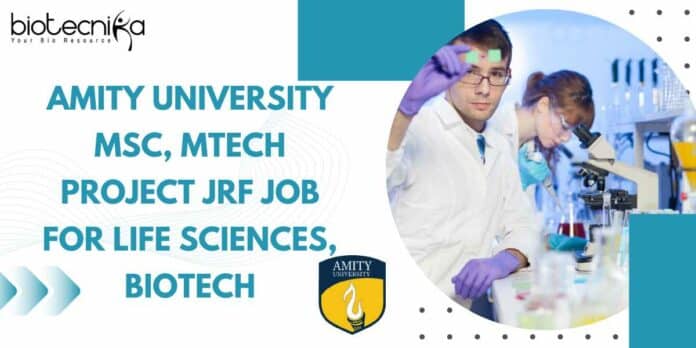Amity University MSc MTech Project JRF Job For Life Sciences, Biotech
Amity University MSc MTech Project JRF Job For Life Sciences, Biotech. Look out for exciting opportunities! for the JRF position at Amity University. Interested and eligible candidates check out all the details given the same below.
This job expires in
Adv/AUUP/HR/23/259
Amity Institute of Biotechnology
Invites
Applications for Junior Research Fellow
Applications are invited from highly motivated and bright candidates for the following assignment on a time-bound research project undertaken in the Amity Institute of Biotechnology, Amity University, Noida.
Name of Posts: Junior Research Fellow
Number of posts: 01
Name of the Research Project: “Biological significance of disease specific sialo glycosylation in Triple negative Breast Cancer”
Name of sponsoring agency: ICMR
Duration of the position: 3 years
Age Limit: 35 years
How to Apply:
- Appointment of the applicant will be governed by the terms and conditions of the funding agency particularly applicable to the said project.
- Interested candidates should submit their application with details of academic qualifications within 10 days of this advertisement to [email protected] and [email protected] with cc to [email protected]
- Please mention “JRF- ICMR-AIB in the subject line
- No TA/ DA will be paid to the candidates for attending the interview.
Fellowship / Monthly compensation: Rs.31,000/- + 27%HRA
Essential qualifications
- M.Sc. / M.Tech. in Life Science / Biotechnology / Molecular Biotechnology / Medical Biotechnology / Biochemistry from a recognized university with 60% marks or equivalent CGPA.
- Candidates should be CSIR-UGC NET qualified or equivalent with 2 years of research experience.
Desirable: The candidate should have basic knowledge of protein Biochemistry will be preferred.
Click here for the notification
Possible interview questions may be asked for the JRF position at Amity University
1.Can you explain the research project you will be working on? Answer: The research project focuses on investigating the biological significance of disease-specific sialo glycosylation in Triple negative Breast Cancer. It aims to study the role of specific sugar modifications (sialo glycosylation) on proteins in the context of Triple negative Breast Cancer and its potential implications in disease progression.
2. What is your educational background, and how does it align with the qualifications required for the position?
Answer: I hold an M.Sc./M.Tech. degree in Life Science/Biotechnology/Molecular Biotechnology/Medical Biotechnology/Biochemistry from a recognized university with 60% marks. Additionally, I am CSIR-UGC NET qualified and have 2 years of research experience, making me eligible for the Junior Research Fellow position.
3. What are your research experiences, and how do they relate to the current project? Answer: During my previous research experiences, I have worked on projects related to protein biochemistry and cancer biology. I have experience in studying protein modifications and their impact on disease pathways. These skills align well with the focus of the current project on sialo glycosylation in Triple negative Breast Cancer.
4. What do you understand about sialo glycosylation and its potential relevance to Triple negative Breast Cancer? Answer: Sialo glycosylation refers to the addition of sialic acid sugar molecules to proteins. It is known to play crucial roles in cell signaling, adhesion, and immune responses. In the context of Triple negative Breast Cancer, specific sialo glycosylation patterns on proteins might be associated with disease progression, metastasis, or drug resistance. Understanding these modifications can provide valuable insights into the disease mechanisms and potential therapeutic targets.
5. Can you describe any relevant techniques or methodologies you have used in your previous research? Answer: In my previous research, I have utilized techniques such as Western blotting, immunoprecipitation, mass spectrometry, and cell culture assays to study protein modifications and their functional consequences. These techniques can be valuable in investigating sialo glycosylation patterns in Triple negative Breast Cancer.
Editor’s Note: Amity University MSc MTech Project JRF Job For Life Sciences, Biotech. Please ensure you are subscribed to the Biotecnika Times Newsletter and our YouTube channel to be notified of the latest industry news. Follow us on social media like Twitter, Telegram, Facebook































